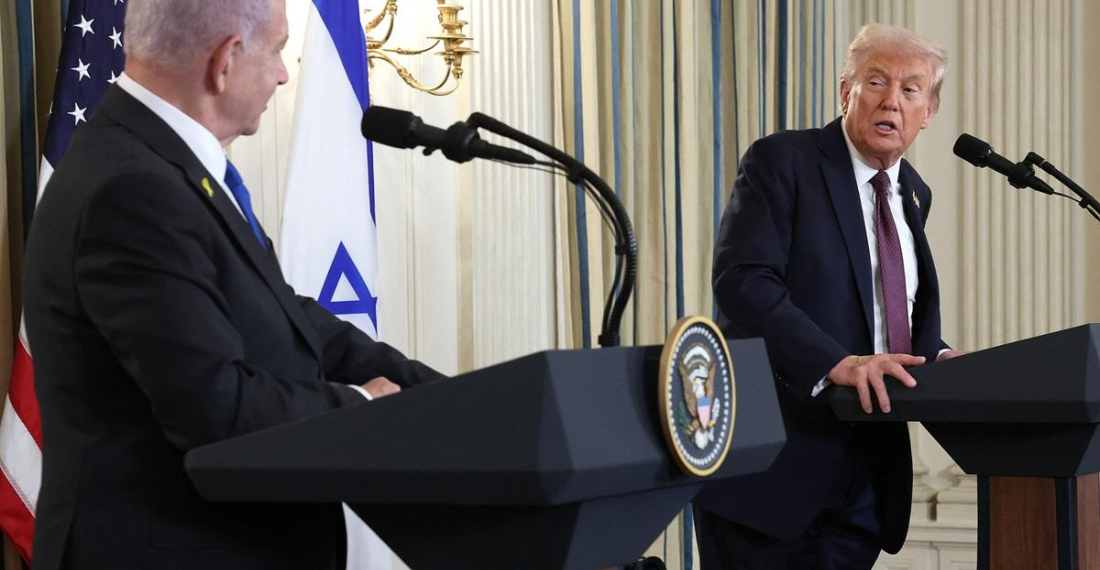US President Donald Trump on Monday 29 September laid out a 20-point proposal supported by Israeli Prime Minister Benjamin Netanyahu that would end the war in Gaza and free remaining hostages, leaning heavily into conditions that Hamas has previously rejected. Hamas is reviewing the plan while the Palestinian government in the occupied West Bank said it welcomed Trump’s plan to end the war and pledged to implement the reforms called for in his plan. Trump’s plan calls for establishing a temporary governing committee that would be headed by Trump and include former British Prime Minister Tony Blair. A Palestinian committee of technocrats would oversee civilian affairs, with power handed over later to a reformed Palestinian Authority.
A senior Hamas official told AP that the group’s leaders will hold internal discussions as well as talks with other Palestinian factions before they respond to the Trump proposal. The official added that Hamas received the proposal from the two Mideast mediators, Egypt and Qatar, and “will begin studying it” with other factions.
There’s little mention of the goal of Palestinian statehood, what many in the region and beyond say is the linchpin for long-term peace. The proposal largely sidelines the Palestinian Authority until it completes vast reforms. And a requirement for Hamas to disarm has been dismissed as a non-starter in earlier negotiations.
Backing and support were pouring in for the proposal from the international community. French President Emmanuel Macron says he welcomes Trump’s “commitment to ending the war in Gaza and securing the release of all hostages.” “I expect Israel to engage resolutely on this basis. Hamas has no choice but to immediately release all hostages and follow this plan,” Macron posted on X.
The governments of Egypt, Jordan, Indonesia Pakistan, Turkey, Qatar, Saudi Arabia, and United Arab Emirates issued a joint statement applauding Trump’s proposal.
Qatar’s prime minister and Egypt’s intelligence chief presented Trump’s proposal to Hamas negotiators, who are now reviewing it in “good faith,” according to a person familiar with the matter. The person was not authorised to comment, according to AP, and spoke on the condition of anonymity.
Many points of tension remain. “If Hamas rejects your plan, Mr. President, or if they supposedly accept it and then do everything to counter it, then Israel will finish the job by itself,” Netanyahu said after meeting with Trump at the White House. “This can be done the easy way or it can be done the hard way, but it will be done.”
The plan does not require people to leave the Gaza Strip as laid out in an earlier Trump plan roundly rejected by Palestinians and regional leaders. It does call for all remaining hostages to be released by Hamas within 72 hours of Israel accepting the plan, an effort that would seem difficult to complete with the captives believed to be spread throughout the territory. A senior Trump administration official, who was not authorised to discuss the plan’s details publicly but was quoted by AP, said the 72 hours starts when Hamas accepts the proposal.
Hundreds of Palestinians, including many serving life sentences, will be released by Israel, according to the proposal. “I think we are beyond very close,” Trump said. “We’re not quite finished. We have to get Hamas.” While Hamas has said in the past that it would agree to step back from governing Gaza, the militant group has refused to disarm, something Netanyahu has long demanded as part of any long-term truce to end the war.
The president promised Netanyahu that Israel would have his administration’s “full backing” to further decimate Hamas if the group doesn’t agree to the proposal. “This is a different Hamas,” Trump said. “Their leadership has been killed three times over. So you’re really dealing with different people.”
Netanyahu on Monday also attempted to mend fences with Qatar, the key Hamas interlocutor and an important U.S. ally. He expressed his regret to his Qatari counterpart for a Sept. 9 military strike targeting Hamas officials in the Gulf emirate that infuriated Arab leaders and triggered rare criticism by the U.S. of Israel. Netanyahu made the call to Qatar’s prime minister, Sheikh Mohammed bin Abdulrahman Al Thani, as he met with Trump. Trump described the exchange between the Israeli and Qatari leaders as a “heart-to-heart” call.
Israel stuck the headquarters of Hamas’ political leadership in Qatar as the group’s top figures gathered to consider a U.S. proposal for a ceasefire in Gaza. The strike on the territory of a U.S. ally was a huge escalation and risked upending talks aimed at winding down the war and freeing hostages. No senior Hamas officials were killed in the strike.
The Trump plan indicates that once all hostages are returned, Hamas members who “commit to peaceful co-existence and to decommission their weapons will be given amnesty.” The plan adds that members of Hamas who wish to leave Gaza would be provided safe passage to receiving countries.
Trump discussed the plan with Arab and Islamic leaders in New York last week on the sidelines of the U.N. General Assembly. He hailed the deal, if it coalesces, as a potential breakthrough moment that would usher in lasting peace and an era prosperity in the Middle East. “I challenge the Palestinians to take responsibility for their destiny because that’s what we’re giving them. We’re giving them responsibility for their destiny,” he said.






